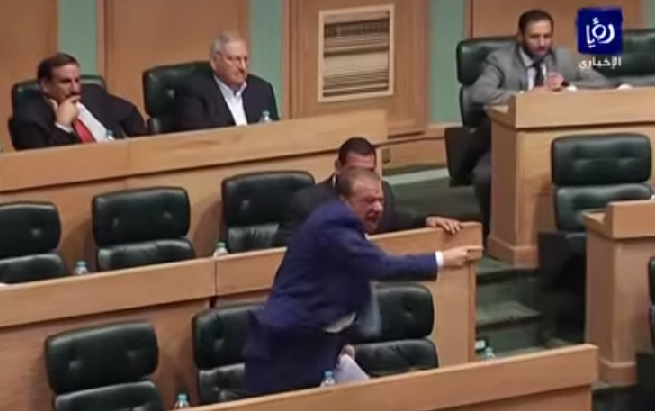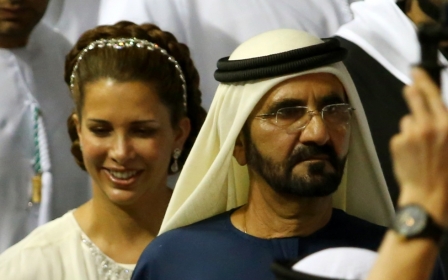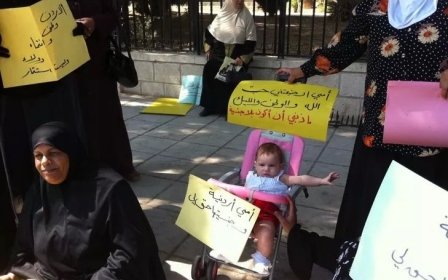Squabbling politicians bring Jordan's parliament to a halt

A Jordanian parliamentary session was suspended on Tuesday night as politicians yelled and cursed one another over the recent arrest of a member of the Muslim Brotherhood.
The skirmish began after Abdelmajid al-Aqtash, an Islamist MP, criticised the recent arrest of Zaki Bani Arshid, the Deputy Supervisor of the Muslim Brotherhood.
Last month in a column published on several websites, Bani Arshid spoke out against the United Arab Emirates’ terrorist list, released on 15 November, which included the Brotherhood and various Islamic think-tanks across the world among the 83 organisations listed.
Soon after the column was published, Jordanian authorities arrested Bani Arshid in a move they say was meant to “preserve Jordan’s interests and relations with a brotherly nation [the UAE] that hosts a considerable number of Jordanians".
In Tuesday's parliamentary session, Al-Aqtash asked whether the UAE had taken the place of UN as a terrorist watchdog, and then started to list all of the positive qualities the Muslim Brotherhood has offered to Jordanian politics.
Al-Aqtash was quickly drowned out by other MPs who accused the group of being a terrorist organisation and of collaborating with Hamas, the political faction that rules Gaza. Al-Aqtash, in turn, attacked Arab nationalists and leftists politicans, accused them of conspiring against Jordan in the 1970s and also raised the issue of government repression and exclusion of imams leading Friday prayer sermons.
"Are we to leave the pulpits to the leftists and the nationalists?" he asked the politicians.
As accusations of collaboration and curses flew between the politicians, Ahmad Safadi, the House of Representatives Speaker, looked on, unable to control the situation despite repeated appeals for calm.
The fighting hit a climax when an incensed Hind al-Fayez, daughter of the late Arab nationalist Hakem al-Fayez and member of Jordan's Democratic Alliance bloc, refused to sit in her seat to let MP Yahya al-Saoud speak. A frustrated al-Saoud finally erupted, and cursed the parliament quota which allocates 15 out of its 150 seats to women.
Al-Fayez remained standing, before scathingly responding, “Shame on you, Yahya. I am the daughter of the Governor al-Fayez, and it wasn’t the intelligence services that brought me to the council.”
When Safadi ordered him to apologise, al-Saoud refused, repeated his curse and recited one of Prophet Mohammad’s sayings of how a woman praying inside her house is better than praying in mosques.
After the ten-minute or so debacle, Safadi eventually suspended the session to Wednesday morning.
Jordanians jumped on social media following the incident, tweeting about the showdown. One user compared the fight to a busy vegetable marketplace, with vendors shouting out the prices of their products over each other.
This is not the first time that Jordan’s parliament has witnessed a frenzied altercation, nor is it al-Saoud’s first fiery dispute in the course of parliamentary business.
Last September, a squabble over parliamentary procedure almost brought al-Saoud and MP Qusay al-Damissi to fisticuffs, with the former taking off his belt and the latter his shoes before they were separated. Shortly after the fight, another MP, Talal al-Sharif, shot Al-Damissi with a Kalashnikov rifle in a hallway outside the Chambers, but no one was hurt.
Al-Sharif was later arrested for 15 days and charged with possession of an unlicensed firearm, resisting security forces, and attempted murder.
Sean Yom, an assistant professor of political ccience at Temple University in Philadelphia, said that fights like within Jordan's parliament, like the one on Wednesday, are usual occurrences.
“The altercations, threats, potential fist fights are pretty normal,” Yom said. “A lot of that is carried out by the same MPs. Al-Saoud is an incendiary member, known for his outbursts on the floor.”
Parliamentary shenanigans, Yom said, feed a growing divide between the politicians and Jordanians who view the MPs as self-interested and corrupt - and serve the interests of “those in decision-making circles” content to paint the House of Representatives as a farce.
“All of this is happening under the watchful eye of the palace,” he said. “They are fine with seeing parliament turned into a charade because it feeds into the opinion that Jordan is not ready for democracy, and that people should place their faith in the king.”
Middle East Eye propose une couverture et une analyse indépendantes et incomparables du Moyen-Orient, de l’Afrique du Nord et d’autres régions du monde. Pour en savoir plus sur la reprise de ce contenu et les frais qui s’appliquent, veuillez remplir ce formulaire [en anglais]. Pour en savoir plus sur MEE, cliquez ici [en anglais].




